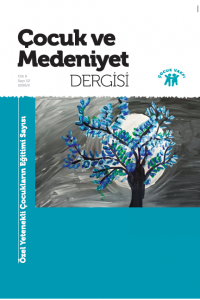Öz
Çok küçük yaştan itibaren farklı düşünceler, projeler. Ancak okul yaşamında başarısızlıklar. Yeteneğin ve zorluğun arasında sıkışmış bir çocuk nasıl tanılanmalı? Bu durum sadece zeka testleri ile anlaşılabilir mi? Bu araştırmada, bu sorulara cevap verebilmek için öğrenme güçlüğü olan üstün yetenekli öğrencilerin özelliklerinin ve tanılanmasının açıklanması amaçlanmıştır. Bu amaç doğrultusunda üstün yetenek, öğrenme güçlüğü kavramları öncelikle ele alınmış, ardından öğrenme güçlüğü olan üstün yetenekli öğrencilerin özellikleri ve tanılanması, ulusal ve uluslararası alan yazınla birlikte açıklanmıştır. Üstün yeteneklerin ve güçlüklerin bir araya gelerek oluşturduğu bu farklı öğrencilerin doğru tanılanması ve yönlendirilmesi için ilgili çalışmalarla beraber Türkiye’de yapılması gerekenler son bölümde tartışılmıştır.
Anahtar Kelimeler
Kaynakça
- Alsop, G. (2003). Asynchrony: Intuitively valid and theoretically reliable. Roeper Review, 25(3), 118– 127.
- Altun, T., ve Uzuner, F. G. (2016). Sınıf öğretmenlerinin özel öğrenme güçlüğü olan öğrencilerin eğitimine yönelik görüşleri, The Journal of Academic Social Science Studies, 44(33-49).
- American Psychiatric Association. (2013). Diagnostic and statistical manual of mental disorders (5th ed.). Arlington, VA: Author.
- Assouline, S. G., Foley Nicpon, M., ve Whiteman, C. (2010). Cognitive and psychosocial characteristics of gifted students with written language disability. Gifted Child Quarterly, 54, 102-115.
- Baldwin, L., Omdal, S. N., ve Pereles, D. (2015). Beyond stereotypes: Understanding, recognizing, and working with twice-exceptional learners. Teaching Exceptional Children, 47(4), 216-225.
- Başar, M., & Göncü, A. (2018). Sınıf öğretmenlerinin öğrenme güçlüğüyle ilgili kavram yanılgılarının giderilmesi ve öğretmen görüşlerinin değerlendirilmesi. Hacettepe Üniversitesi Eğitim Fakültesi Dergisi, 33(1), 185-206.
- Baum, S. (1990). The gifted/learning disabled: A paradox for teachers. from preventing school failure. The Education Digest 55(8), 54–56.
- Baum. S. M. (1990). Gifted but learning disabled: A puzzling paradox. Retrieved on April 30, 2020, http://www.hoagiesgifted.org/eric/e479.html
- Baum, S., ve Novak, C. (2010). Why isn’t talent development on the IEP? SEM and the twice exceptional learner. Gifted Education International, 26, 249-260.
- Beckmann, E., ve Minnaert, A. (2018). Non-cognitive characteristics of gifted students with learning disabilities: An in-depth systematic review. Frontiers in Psychology, 9, 504. https://doi. org/10.3389/fpsyg.2018.00504
- Berninger, V. W. (2006). Research-supported ideas for implementing reauthorized IDEA with intelligent professional psychological services. Psychology in the Schools, 43(7), 781-796.
- Berninger, V., ve Swanson, H. L. (2013). Diagnosing and treating specific learning disabilities in reference to the brain’s working memory system. In H. L. Swanson, K. R. Harris, ve S. Graham (Eds.), Handbook of learning disabilities (2nd ed., pp. 169–185). New York: Guilford Press.
- Besnoy, K. D., Swoszowski, N. C., Newman, J. L., Floyd, A., Jones, P., ve Byrne, C. (2015). The advocacy experiences of parents of elementary age, twice-exceptional children. Gifted Child Quarterly, 59, 108-123.
- Bianco, M., ve Leech, N. L. (2010). Twice-exceptional learners: Effects of teacher preparation and disability labels on gifted referrals. Teacher Education and Special Education, 33(4), 319-334.
Ayrıntılar
| Birincil Dil | Türkçe |
|---|---|
| Konular | Alan Eğitimleri |
| Bölüm | Araştırma Makaleleri |
| Yazarlar | |
| Yayımlanma Tarihi | 29 Aralık 2020 |
| Yayımlandığı Sayı | Yıl 2020 Cilt: 5 Sayı: 10 |


